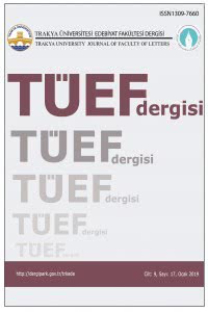TÜRKÇE VE BULGARCADA ZAMAN/GÖRÜNÜŞ
Türkçe ve Bulgarcada zamanlar, bitmemiş ve bitmiş görünüş, zamanın sınıflandırılması
TENSE/ASPECT IN TURKISH AND BULGARIAN
Tenses in Turkish and Bulgarian, imperfective and perfective aspect, classification of tenses,
___
- Banguoğlu, Tahsin, Türkçenin Grameri, Türk Dil Kurumu Yayınları, 10. Baskı, Ankara, 2015.
- Barbolova, Zoya, Sıvremenen Bılgarski Ezik-Morfologiya, Sofya, 1997.
- Benzer, Ahmet, Türkçede Zaman, Görünüş ve Kiplik, Kabalcı Yayınevi, İstanbul, 2012.
- Boyaciev, Todor; İvan Kutsarov; Yordan Pençev, Sıvremenen Bılgarski Ezik, İzdatelska Kışta Petır Beron, Sofya, 1999.
- Cömertel, Serkan, “Bulgarcada Fiillerin İkinci Derece Bitmemiş Görünüş Kazanması”, Trakya Üniversitesi Edebiyat Fakültesi Dergisi, Cilt: 6, Sayı: 12, Temmuz 2016, s. 145-156.
- Cömertel, Serkan, “Bulgarcada Zaman Sistemi ve Merkezdeki Şimdiki Zaman”, Trakya Üniversitesi Edebiyat Fakültesi Dergisi, Cilt: 7, Sayı: 13, Ocak 2017, s. 141- 159a.
- Cömertel, Serkan, “Bulgarcada Fiilin Görünüşü”, Türkoloji Araştırmaları 2017 (Туркологични изследвания 2017), Şumnu Episkop Konstantin Preslavski Üniversitesi Yayınları, 2017, s. 64-78b.
- Cömertel, Serkan, Bulgarca Fiillerin Çekim Sistemi, Ceren Yayıncılık, Edirne, 2018.
- Gencan, Tahir Nejat, Dilbilgisi, Tek Ağaç Eylül Yayıncılık, Ankara, 2007.
- İvanov, D.; B. Krıstev; R. Boneva, Bılgarski Ezik (Za Çujdestrannite Studenti, Sledvaşti vıv Visşite Uçebni Zavedeniya), Nauka i İzkustvo, Sofya, 1969.
- Johanson, Lars, Türkçede Görünüş, Çev: Nurettin Demir, Grafiker Yayınları, Ankara, 2016.
- Paşov, Petır, Bılgarska Gramatika, İzdatelska Kışta Hermes, Plovdiv, 1999.
- Paşova, Mariya, Gramatika na Sıvremenniya Bılgarski Ezik, İzdatelstvo İztok-Zapad, Sofya, 2014.
- Stankov, Valentin, Stilistiçni Osobenosti na Bılgarskiya Glagol, Dırjavno İzdatelstvo Narodna Prosveta, Sofya, 1981.
- Stoyanov, Stoyan, Gramatika na Bılgarskiya Knijoven Ezik - Fonetika i Morfologiya, 2. Baskı, İzdatelstvo Nauka i İzkustvo, Sofya, 1977.
- Torun, Yeter, “Türkiye Türkçesinde -Acak + İyelik Eki + Yönelme Durumu Yapısı”, Turkish Studies - International Periodical for the Languages, Literature and History of Turkish or Turkic, Cilt: 8, Sayı: 9, Yaz 2013, s. 2421-2430.
- Yordanova, Milena, Gramatiçen Minimum po Turski Ezik, Universitetsko İzdatelstvo Sv. Kliment Ohridski, Sofya, 2015.
- Akademiçen Tursko Bılgarski Reçnik & Akademik Türkçe Bulgarca Sözlük, İzdatelstvo Riva, Sofya, 2009.
- Bılgarski Tılkoven Reçnik, Nauka i İzkustvo, Sofya, 2008.
- Bılgarski Tılkoven Reçnik, İzdatelska Kışta Hermes, Plovdiv, 2004.
- Karaağaç, Günay, Dil Bilimi Terimleri Sözlüğü, Türk Dil Kurumu Yayınları, Ankara, 2013.
- Tursko Bılgarski Reçnik / Bılgarsko Turski Reçnik & Türkçe Bulgarca Sözlük / Bulgarca Türkçe Sözlük, Gaberoff, Veliko Tırnovo, 2009.
- Türkçe Sözlük, Türk Dil Kurumu Yayınları, Ankara, 2011.
- Yazım Kılavuzu, Türk Dil Kurumu Yayınları, Ankara, 2012.
- Petrova, Stefka; Pravda Tsankova; Elitsa Kurteva; Kristina Tomova; İvan İliev, Uçete Bılgarski Ezik (Nivo 2B), Sofiyski Universitet Sv. Kliment Ohridski Departament za Ezikovo Obuçenie -(İÇS), İzdatelstvo D-r İvan Bogorov, Sofya, 2005.
- ISSN: 1309-7660
- Yayın Aralığı: 2
- Başlangıç: 2011
- Yayıncı: -
Fast Forwarding with Audiovisual Translation
AÇLIK OYUNLARINI KIM OYNUYOR: ARTEMIS MI PERSEFONI MI? SUZANNE COLLINS’IN ÜÇLEMESINDE PERSEFONI MITI
The Shakespeare Circle: An Alternative Biography
TÜRKÇE VE BULGARCADA ZAMAN/GÖRÜNÜŞ
CARLO GOLDONI VE LOKANTACI KADIN ADLI YAPITINDA TOPLUMSAL ÖGELER
TÜRKİYE TÜRKÇESİ AĞIZLARINDA YER-YÖN BİLDİREN İFADELER
